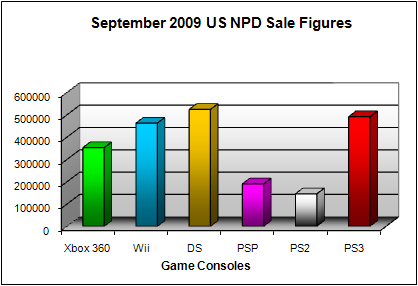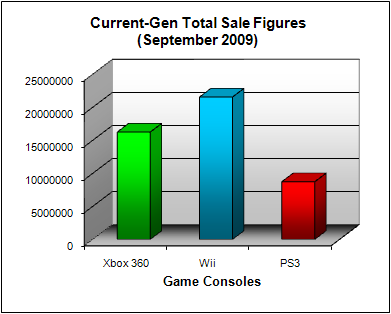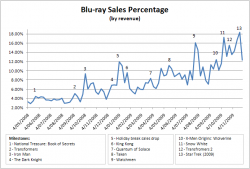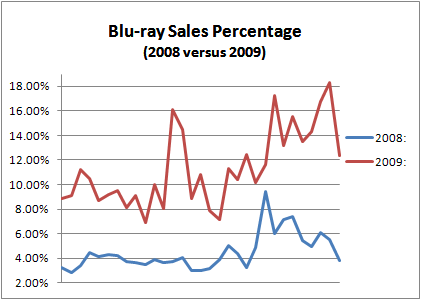Not a busy weeks in terms of news, but a busy for me in any case. I wrote up the NPD September 2009 video games sales analysis on Tuesday. A very big month for Sony as the PS3 becomes number one for the first time ever, although Microsoft will be happy to dominate total sales, especially with software. Nintendo will be concerned, and will hope that the PS3 numbers are at a temporary high due to the release of the new Slim SKU. But then later on in the week, my computer‘s graphic card’s fan stopped working, and so I had to quickly buy a replacement while I wait for warranty service. A blessing in disguise perhaps since I was about 2 weeks away from the end of the warranty period. Anyway, I got Radeon 4550 as a temporary replacement which I can then use in a new home theater PC build sometime next year. The best thing about the card is that it’s a passive one, no fans that will make noises and then break and force me to get a replacement. The computer is a bit more quieter than it was before, and sometimes I have to check twice just to make sure it is actually on. This card should work great in a home theater system, and I tested Blu-ray playback (see earlier test) and CPU usage was still very low, hovering at under 10% under PowerDVD 9. Gaming performance is average as you would expect, but still playable. Anyway, onto the news, which as I mentioned before, was few and far between due to various factors (such as the launch of Windows 7).

In copyright news, The Pirate Bay appeals trial should now be delayed until next year. This is because of the bias allegations that the TPB defence team has filed against two of the judges that were supposed to sit on the case. TPB had earlier requested a delay which was rejected, so they get what they want now anyway.
And believe it or not, this was pretty much all the news I managed to find. Sure, there were lots about MPAA’s boss saying he will quit next year when his contract runs out, but that was sort of covered in last week’s WNR in regards to the MPAA restructuring due to the studios’ assertion that the MPAA has been too soft. A few others have already left as a result.
You can tell it’s a quiet week piracy wise because when you search for piracy on Google News, most of the news stories were about the maritime kind. And maybe that’s the way it is supposed to be. Copyright holders like to make a big fuss about online piracy, but compared to what’s going on over in Somalia, I mean, it’s pretty non consequential. When I think of the Somalian pirates, I think of the “you wouldn’t steal a car” anti-piracy ads – heck, not only would they steal the car, they’ll steal the cargo ship the car was being transported on as well, get the crew’s DVD library, rip them, and upload them onto The Pirate Bay just for fun. Now that’s piracy!
And then there’s this story about Disney’s new Keychest initiative. Upon the first read, it seems just like another pointless DRM exercise, but this one might lead to something interesting, maybe even revolutionary. When you buy a movie today, you are not actually buying anything other than the movie in a particular format. And unless you get a digital copy with it, it’s pretty much locked to that format. Some argue you should be able to rip it and then convert it into another format, but if you read the license stuff and observe the US DMCA (or your country’s equivalent), then ripping it would be very much illegal. So if the digital copy was not present or isn’t iPod compatible, then to get an iPod version, you’ll have to buy it through iTunes, despite the fact that you may already have purchased the movie on Blu-ray and DVD (very likely if you’re buying a Disney Blu-ray, which usually comes with the DVD version now).
The idea behind Keychest is that instead of you buying a movie locked to a format, you simply buy a license to watch the movie, regardless of the format. Using this license, which can come in the form of a digital key or certificate, you can then download various versions of the movie for various formats. The key might come bundled with the Blu-ray/DVD version of the movie, allowing you to download the iPod version from the Internet. And, from what I’ve read, you can have multiple copies and each can be played simultaneously (obviously there would be some limit, as you don’t want one key to be able to supply the entire world with access to the movie).
Why is this a good idea? I’ve always thought that buying a movie means you’re buying the viewing rights anyway, and that you should be able to transcode it to another format. This holds true for CD to MP3 ripping, for example, but does not hold true for Blu-ray and DVD simply because there is copy protection mechanisms in the way. But buying a license technically means that regardless of where you sourced the movie, you have the right to view it since you’ve paid for it, even if the source may be of a less than legal kind. Of course, the license could limit you to downloading the movie from approved sources, for legal or commercial reasons, but you are again locked into buying formats, the only difference being that you have more choice over which format to get it on. But for a true revolution, it should mean that as long as you have a license, you can download it from anywhere, or perhaps even offer an exception that allows you to break the copy protection on discs to get the movie into the format you want. And it would all remain legal. Of course, the license may cost more than the cost of your average DVD, but such a license would also mean that you can supply your various devices and your immediate family’s various devices with copies of the movie, a “home license” if you will, and that would be very convenient indeed. And to extend things further, how about a yearly license subscriptions that allows you to enjoy all Disney movies being released for the home video market for the year?
Buy why is it also a bad idea? In one word? Control. With Keychest, you may end up giving more control over to the studios as to how you watch movies. Because while a “home license” is a good thing, the opposite means that for those without this kind of license, or those who simply purchased the DVD version and not the Keychest license, then trying to do anything other than to watch the DVD in your DVD player could be illegal. Right now, you can argue that since there’s no legal alternative, you have to rip the DVD and make a version for your portable media player. With Keychest being the legal alternative, you won’t have this argument anymore. But that’s not really a huge problem since ripping a DVD is already illegal anyway. The bigger problem is that Keychest is still another form of DRM, and that means while you may be given a huge amount of freedom with this new kind of licensing scheme, that freedom is still being “given” to you by the studios, and something given can be taken away. If Disney one day finds that Keychest is losing them a lot of money, then they can simply pull the authentication servers, and those with Keychest licenses will find them useless. This is the pitfall of all DRM schemes.
DRM free, monthly subscription, all you can download, unlimited viewing and access to all back catalogues through your set top box, game console, PC or iPod/iPhone. Now that’s what I call real freedom.

Let’s move onto high def news. I did the Blu-ray sales analysis last week, and Blu-ray sales were way up as expected. I deliberately chose not to look at the DVD sales numbers since I wanted to concentrate on how Blu-ray was doing, but when one does take into account the DVD numbers, the news isn’t as rosy.
While Blu-ray sales are up 66% compared to a year ago, Blu-ray and DVD sales combined are actually down 13.9%. What has been observed is that the drop in DVD sales has been way faster than any growth on Blu-ray, and that the industry is still hemorrhaging. I theorized before that Blu-ray might actually be partially causing the decline in DVD sales, as people upgrade their equipment and buy more expensive movies leaves then with less cash to buy movies that are not what you would call “must have’s”, especially during these economic times. I for one have cut down my movie buying to a minimum, still buying Blu-ray’s and the occasional $5 DVD movies, but I can’t justify buying “meh” movies just because they’re on sale anymore, not when I’ve just paid full price for a copy of Taken on Blu-ray. So even just looking at my own buying habits, Blu-ray sales (buys) are way up, and DVD sales are way down, and I probably end up spending less on movies as a result. Which is good, because I’d rather spend the money on video games anyway. And there in lies the problem.
And then there was the whole HD DVD disaster, which wasted the time, effort and money of a lot of people, although for simple movie viewing, it was a great time and it still is if you can grab some HD DVD movies for as low as $1. Some who supported HD DVD from the get go will have lost confidence in the home video industry that allowed this sort of thing to happen (again). Those who got into HD DVD after its fall to take advantage of the fire sales, like myself, are still somewhat satisfied, but certainly won’t bother to re-buy those movies on Blu-ray again, especially when most of these movies were hardly the “must-have” variety. Either way, the whole thing a negative effect on Blu-ray and on DVD at time when it could least afford to lose more ground to video games and new forms of entertainment. But I bring up HD DVD again as it’s near to Halloween, and it has risen from the grave, sort of, for one more time at least. A new movie is being released on the dead format, and suitably, it is a zombie movie. It’s a limited collector’s edition as well, numbered and comes with a certificate and everything. The movie, DeadLands 2, is not available on Blu-ray.
And speaking of rising from death, that old “Xbox 360’s gonna have a Blu-ray drive, OGM LOL” rumour has surfaced again. This time after a misquote from Steve Ballmer, possibly taken out of context, where he was supposed to have said “you’ll be able to get Blu-ray drives as accessories”. But he was referring to the PC (in relation to Windows 7’s launch), and not the Xbox 360, but it didn’t take long for the Net to be filled with headlines of “Microsoft CEO: Xbox 360 definitely getting Blu-ray drive”. Definitely!
Ballmer said in the same interview that “the future of movies is on-demand, actually, as opposed to distribution via physical media”, which I think tells you all you need to know about Microsoft’s strategy on movies. Downloads Yes. Discs, Blu-ray in particular, No. But Windows 7 supports Blu-ray burning out of the box (although you’ll still need a software Blu-ray player to play Blu-ray movies, perhaps taking advantage of the 70% Off WinDVD Pro 2010 deal that’s available right now – a deal that was leaked, but linked to the launch of Windows 7), so Microsoft is not abandoning the format in any way. It just doesn’t see the Xbox 360 needing it.
I don’t know why this rumour gets thrown about every couple of months. There’s almost no demand from Xbox 360 users for a Blu-ray drive accessory, especially considering how cheap a standalone Blu-ray player is these days, not to mention how much better even a cheap standalone would be compared to playing movies on a game console (Sony PS3 is only acceptable with the remote add-on, but “serious” HT people still scoff at it’s lack of bitstreaming of the original PS3, its looks and the lack of an LCD display). It seems there are certain segments of the public that would view having Blu-ray on the Xbox 360 as the ultimate concession of defeat by the HD DVD group (which no longer even exists, btw), and by Microsoft for supporting the ill fated format. Toshiba’s indirect issue of a “mea culpa”, by releasing their first Blu-ray player, wasn’t enough apparently. And it’s not just admitting defeat on the HD DVD front, but if Microsoft does go Blu, then it vindicates Sony’s decision to include the Blu-ray drive in the PS3 at the cost of delays, huge losses, and slowed market penetration. Microsoft will point to their 2:1 sales lead (albeit a diminishing lead if September’s video games sales results become a norm) as vindication that not giving a crap about a built-in HD movie disc player was the right decision. The funny thing is that nobody accosts Nintendo for not even including a DVD player in the Wii, despite it having a DVD drive. Where are the rumours that the Wii is getting a software update or a Wii Shop purchase that enables DVD playback, as that would be much more believable in my opinion.
![]()
And moving on finally to gaming, despite having moved into this area about two paragraphs ago, the PS3 firmware kills the Blu-ray drive story continues, not just in court, but also with some independent PS3 fans and developers/hackers wanting people’s dead PS3s so they can do their stuff and determine just why they brick after a new firmware update.

A group is taking the PS3 apart to find out why firmware updates brick it (possibly not literally though)
They have already narrowed their suspicions down to a file that is part of the firmware package, which updates the Blu-ray drive’s firmware. Firmware updates are dangerous. The frequency in which Sony releases firmware updates has always been a cause for concern, as is their strategy of “adding value to the PS3 through software”. It’s good in theory, but you better make damn sure you do enough beta testing, on all SKUs, and to put in safeguards to prevent a bad firmware update bricking the machine. But with the frequency of updates, and the jumble of hardware (even under the same SKU), I can’t see a way for Sony to be able to ensure their firmware is 100% safe. And despite so many updates, none of them were even as big in sale (in terms of changes) as the New Xbox Experience update. The PS3 interface still looks pretty much the same as the one that came with the launch machine, except now some of these PS3s won’t play any discs at all anymore. And it’s also important to differentiate between a firmware update and a software update. With game consoles, the lines more blurred than compared to say Windows, since the hardware is much more specialised and linked with the software (hence the need for firmware). Software updates can be frequent, but firmware updates should be kept to a minimum.
It would be really interesting to know what the repair process is for this kind of problem at Sony tech support. If they’re simply ripping out the drive and replacing it with a new one, then it’s probably a hardware issue with the drive. And I’ve theorized before that the firmware simply detects faulty drives and turn them off to prevent further damage, so it’s not a case where the firmware causes the drive to fail – the drives were already failing to begin with. Another theory is that the firmware update process is buggy on certain drive models, not the actual firmware itself. But if the repair process is simply some kind of low level hardware reset, and if they’re charging people $150 (or $250 here in Australia) for that, then well, that’s not very nice. Maybe this is the sort of thing that will be revealed in the court case, if it proceeds.
And that’s it for the week. Thanks for reading, but no need for burning afterwards though. It’s bad the for environment!














